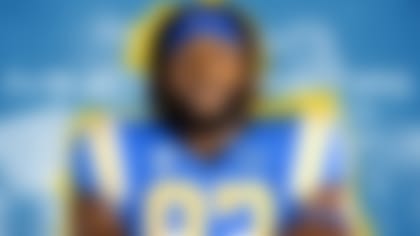Two years after a gruesome knee injury ended his season, Georgia's Nick Chubb has NFL back in sight
By Chase Goodbread | Sept. 6, 2017
CEDARTOWN, Ga. -- It only made sense the injury which altered the course of Nick Chubb's football career came on the first play of the game. Tennessee fans were still settling into their Neyland Stadium seats to take in the 2015 game against SEC East rival Georgia when the Bulldogs' opening play -- a pitch left to Chubb out of the I-formation -- set off a series of firsts.
Not only was it the first serious injury Chubb had ever sustained, it was the first time Mike Worthington, his trusted high school coach, had ever seen Chubb lay on the turf, even for a second, after a play. The injury itself, if not the first of its kind, was far from ordinary.
And it took someone who is anything but ordinary to overcome it.
"When it happened, there was a lot going through my mind," Chubb said, "but the first question was, 'What had happened to my leg? And second, could it be fixed?"
The answers to those two questions: a gruesome knee dislocation with three ligament tears, and a resounding yes.
It's been more than two years now since Chubb's injury hit both the UGA locker room and his hometown of Cedartown, Ga., like a punch to the gut. Over the next few months -- starting in Indianapolis at the NFL Combine -- scouts will be watching closely to see just how far removed he is from an injury that, for another back, could have been career-ending.
Last summer, a social media video of Chubb squatting 600 pounds went viral, generating headlines, retweets and, yes, a bit more affirmation that the Bulldogs senior had something special in store for 2017. Forgive Worthington if he didn't get overly excited; he had seen Chubb squat 655 in the Cedartown High weight room before the kid ever spent a day in Georgia's.
The Chubb story is a remarkable one at every turn -- from the football field to the classroom to his personal life -- and the chapter on Nick's athleticism could be written by Worthington. The Cedartown track coach and an assistant in the football program, Worthington is a key member of a relatively tight circle of Chubb's trusted confidants.
"You're drawn to kids who are willing to put in the time and make sacrifices, and I've never been around a kid more willing to do that than Nick," Worthington said.
The combination of Worthington's aggressive training style and Chubb's insatiable appetite for weightlifting conspired to produce a man-among-boys high school athlete who eventually drew scholarship offers across the SEC. About a year after Chubb picked up a shot put for the first time, he won a Georgia state title with it, on a throw of 55 feet. At the same state meet, he qualified for the 100- and 200-meter dashes. Check the history of shot put champions who can also sprint with the fastest athletes in a given state. It's not very long.
"Coming into track his senior year, I could have cut his weight and he'd have won the 100 and the 200. But he was drinking two or three protein shakes a day. His weight was going up during track season because it was about getting him ready for Georgia," Worthington said. "He meant enough to us that it wasn't about what I needed as the track coach. He was 226 pounds running the 100-meter dash at the state meet, but we were looking toward the future by that point."
Worthington's training also helped Chubb finish second in the nation in SPARQ testing -- a series of physical tests that includes NFL Scouting Combine events such as the 40-yard dash, the vertical jump and the pro shuttle run -- at the Nike Opening in 2013. Among his competition there were 2017 first-round draft picks such as Leonard Fournette, Jamal Adams, Solomon Thomas, Adoree' Jackson, Deshaun Watson and Derek Barnett, none of whom posted an aggregate score higher than Jackson's 122.7. Chubb blew them all away with a 143.9.
He exceeded 40 inches on the vertical jump, broke 4.5 seconds on a laser-timed 40-yard dash (4.47), and he's bench pressed 225 pounds 26 times, which would have ranked second among running backs (behind Samaje Perine's 30) at the 2017 combine. Whatever extra money there is to be made for Chubb at the combine, consider it claimed.
The day after Chubb's knee injury was a surreal one for the Bulldogs. Chubb sat in the training room, tears in eyes, summoning a steely resolve as teammates fumbled for words of encouragement. The setback wasn't Chubb's alone; it rippled through the locker room and dented team morale.
"It was like someone had died," said George Helow, a graduate assistant who has moved onto Colorado State. "You have to understand, Nick made everyone in the building better every day by the way he worked and carried himself. So it affected a lot of people."
He had torn the PCL (posterior cruciate ligament), MCL (medial collateral) and LCL (lateral collateral) in an instant. There was cartilage damage as well. Yet somehow, his ACL -- the ligament that typically results in a season-ender when torn -- was intact. That there were three torn ligaments made Chubb's injury very serious; that the ACL wasn't made it very unique.
Rehab, in turn, was unique, as well. And arduous.
Recovery from the common ACL tear has advanced over time; it's less often a career-ender, and the recovery window isn't always a full calendar year any longer. Chubb's favorite running back, Adrian Peterson, famously rehabbed one in a single offseason in 2012, then embarked on his best NFL season.
Chubb's injury, however, didn't come with the ACL blueprint, yet he still managed to return to the field in less than a calendar year.
It was 11 weeks before he could even shed his crutches, and his path back to the Georgia backfield was unorthodox. UGA Director of Sports Medicine Ron Courson enrolled Chubb in Taekwondo training, which had not only a physical benefit to recovery, but a mental one as well.
"It played a big role. It helped me trust myself again, trust my knee again," Chubb said. "I had people jumping toward my knee and I was kicking objects to strengthen it. Through all the contact, it let me know my knee was fine."
Another challenge for Courson and his training staff: keeping Chubb from pushing too hard, too soon. Chubb continually stayed a step ahead in the rehab process. In fact, when doctors opted to delay surgery for a couple of weeks to allow swelling to subside, he got some preliminary rehab done even before his operation. Renowned orthopedic surgeon Dr. James Andrews emerged from the procedure and told Chubb's mother, La'Velle, the injury appeared to have already begun healing on its own.
By spring practice of 2016, Chubb was able to do a few things on the field but was still withheld from contact. A few months after that, he started the season opener against North Carolina and rumbled for 222 yards and Georgia's first touchdown of the season, one of two scoring plays on the afternoon for Chubb.
His rehab was well underway by the time UGA coach Kirby Smart was hired to replace Mark Richt, but right away Smart realized the injured star he had inherited was determination personified.
"He's as committed to taking care of his body as anybody I've ever seen," Smart said. "He's one of the first guys in every day."
For Chubb, a full recovery was a question of when, not if. But for NFL scouts, it's a question that's still pending. The Chubb who blasted through defenders like bowling pins through the first 18 games of his college career and the post-injury Chubb of 2016 weren't quite the same player. Chubb himself acknowledged that at SEC Media Days last July, and Smart said the same. But both believe he was a better running back in 2017.
"I feel really good, but only the games will tell," Chubb said in late August before Georgia kicked off its 2017 season in which the running back split time in the backfield with senior Sony Michel and rushed for 1,345 yards with 15 touchdowns. "I'm probably better in terms of speed and quickness."
Added Smart: "I didn't know at the time (in 2016) that he probably wasn't 100 percent, because I don't know that I had seen 100 percent. I've seen it now. He's a lot quicker. I see flashbacks to his freshman year and sophomore year when he was really quick, really explosive. Those things are starting to show back up."
The Chubb from 2014 was thrust into the starting lineup as a replacement for the suspended, and later injured, Todd Gurley. Chubb ravaged SEC defenses to the tune of 1,323 yards over an eight-game stretch to close the season. In the Belk Bowl, he ripped off 266 yards and two touchdowns against a Louisville defense that would place six starters in the NFL draft four months later.
"When I saw him his freshman year, I thought he'd be a first-round pick and the first back drafted in three years, not four," said an NFC West scout with South region responsibilities. "I thought there was no way this guy's going to stay around for four years."
NFL scouts noticed a different runner in 2016, but they were keenly aware of three factors.
1) Chubb wasn't merely bouncing back from a garden-variety knee injury; 2) the Bulldogs offensive line struggled to get push at the point of attack last year, lending itself poorly to Chubb's downhill style; and 3) a late-September sprain to his left ankle -- the same leg of his reconstructed knee -- interrupted his season and, according to former Cedartown coach Scott Hendrix, bothered Chubb more than he ever let on. Despite those impediments, he ran for 1,130 yards and eight touchdowns in 2016.
In Chubb, some see a young Doug Martin or Isaiah Crowell, a potential NFL starter with an extraordinarily powerful lower body and the ability to make one cut, get upfield and leave a tangled wake of tacklers behind him. Yet for all that potential, Chubb's draft status is far from cemented. His draft window in the spring -- depending on who you talked to and how his final season at Georgia went --- was somewhere between the second and sixth rounds. With a solid senior season, that gap has narrowed, and now most project him somewhere after Day 1 in the middle rounds.
For Chubb, the financial gap between Day 2 and Day 3 in the draft is wider than the famed privet hedges at Georgia's Sanford Stadium. Minnesota Vikings RB Dalvin Cook went in the second round of last year's draft and signed a four-year contract for a reported $6.35 million, with a signing bonus of $2.76 million. RB Brandon Wilson of Houston, a sixth-round pick of the Cincinnati Bengals, reportedly signed for a bonus of less than $145,000.
For some draft prospects, that would have been motivation enough.
But money isn't what moves Nick Chubb. "If it was about money for him," La'Velle Chubb said, "he'd have been gone (after his junior season)."
About 10 miles north of Cedartown, near Cave Spring, you'll find what's left of Chubbtown. More than 150 years ago, with the Civil War still ongoing, the Chubb family of free blacks thrived on 120 acres in Floyd County, northwest of Atlanta, with a diverse array of businesses. There was a post office, a saw mill, a blacksmith shop, a syrup mill, a wagon company, and quite a few more. Chubb Chapel United Methodist Church still stands. According to the Atlanta Journal-Constitution, a devastating flood in 1916 wiped out much of what was there, but the values that built it -- primarily, a stoic and no-nonsense work ethic -- were passed through the family lineage.
"He always had that Chubbtown work ethic," said Nick's older brother, Zach.
One of eight Chubb sons who helped found the self-sufficient community was named Nicholas.
Chubbtown is home to Nick's history and heritage, but Cedartown is Chubb's town, home to an ever-growing legacy.
When he was injured, get-well-soon mail poured in from all over the country, but much of it was local. Piles of it came to the family home, piles like they hadn't seen since Nick was recruited, when colleges would stuff the CHS mailbox with up to 60 pieces a day. Nearly two years later, the Chubbs still haven't been able to get through all of it.
But the well-wishers could have rested easy, because there couldn't have been a more perfect candidate to overcome this confounding injury than Chubb. One of the most recognizable players in college football, at a football-crazed SEC school, Chubb stiff-arms the trappings that go along with being a campus celebrity.
He doesn't smoke. He doesn't drink. Around his elders, at least, he doesn't even curse.
"I need to be my best every day. Every day for a practice, every game, for every situation," Chubb said. "Drugs and alcohol slow you down, and I don't need any of that."
The closest thing to a bad habit NFL scouts are likely to unearth on Chubb -- and as with any top draft prospect, they'll turn over every stone -- is a snacking affinity for fruit roll-ups.
"He's an A-1 character kid. Not a vocal guy, but the kind of guy you love to have in your locker room," the NFC West scout said. "He just wants to play football, and that's the kind of guy you build a locker room around."
During the school year, Chubb makes the two-plus hour drive from Athens back to Cedartown as often as possible, fittingly on Georgia State Route 27, matching his No. 27 jersey.
On weekends, on spring break, on holidays, Chubb is around, and the routine is the same. Long, grueling workouts with Worthington are a given, and so is giving back.
He'll check on the newly adopted twins of Jennifer Cox, his ninth-grade science teacher. He'll fulfill a promise to a local girls softball team to return to watch them play. This isn't a case of a small town proudly claiming an elite athlete with a "home of" sign at the city limits, only to be forgotten by its long-gone star. No, the Chubb-Cedartown relationship is very much a two-way bond.
The family of Kriss York, Cedartown High's main office secretary, owns the local theater. When he wants to see a movie on a trip home, the Yorks will let him in through a back entrance. It's the only way. "We'll slip him in -- if we don't he'll never get to his seat," York said. "Because everyone would be all over him."
It's no wonder he remains such a popular local figure. The list of NFL running backs that have hailed from the state of Georgia goes on endlessly -- Herschel Walker, Jamal Lewis, Earnest Byner, Gurley and more -- and in that company, Chubb is the only back in state history to top 2,500 yards in two different seasons. As a sophomore, primarily running dive plays as a triple-option fullback, he racked up 1,600 yards. By the next year, Hendrix switched to the I-formation because of Chubb alone.
"He was too good," Hendrix said. "We had to feature him, get him out in space where he could see more and make more cuts."
As much as Chubb loves his hometown and its people, he's a bit conflicted by his own popularity there. He once returned home and asked Hendrix if he could view that night's Cedartown game from the press box, so he could watch his former team in peace.
"I said, 'Sure, Nick, you can sit in the press box, but you've got to understand, you mean everything to these people,' " Hendrix said. "And they just want a piece of it."
Chubb was in the press box when the game kicked off. Before it had ended, he was in the stands, obliging requests for selfies and autographs.
As La'Velle put it: "You can't take pictures with everyone, but he also doesn't want to say no to anyone."
When Georgia opened its 2014 fall camp, Chubb found himself third on the running back depth chart, behind two future NFL players; Gurley (Rams) was the centerpiece of the offense, and Keith Marshall (Redskins) was next in line. Chubb was a freshman whose place in the pecking order made it uncertain if he would even play, but that would change in a matter of only weeks.
He first caught the eye of the coaching staff by the way he finished runs in team drills: two hands on the ball, sprinting 50 yards downfield at the end of the play. Defensive coordinator Jeremy Pruitt loved it, because it exposed some of his defensive backs who were taking improper pursuit angles. Eventually, Richt was telling veterans who didn't practice to his liking to "watch No. 27" for examples of the effort he demanded.
Weeks later, when Gurley's final college season was twice derailed -- first by an NCAA suspension, and again by a knee injury -- it was Chubb who stepped in for him, rushing for eight consecutive 100-yard games (matching Herschel Walker's school record) and serving notice to the SEC that the Bulldogs' running back pipeline was loaded. It started with a 143-yard effort against Missouri in his starting debut, but for then-offensive coordinator Mike Bobo, now the head coach at Colorado State, it was the Monday practice following that game that told Chubb's story best.
"Nick touched it 40-some times (38 carries, four receptions) in that game, and the following Monday you'd expect him to be a little beat up," Bobo said. "I've never seen anyone practice that hard and fast that day. It was like he didn't even play two days earlier. I turned to coach Richt and said, 'This guy's unreal.' "
Bobo not only knew Chubb was a gifted runner, he knew the quiet kid from the town of only 10,000 was different than most. When Chubb called Bobo to tell him he was committing to Georgia, it was the shortest commitment call he'd ever taken.
"Thirty seconds," Bobo said. "If that. It was, 'I'm committing, coach. Thank you,' and he was on his way. He was always all business.' "
And all business in the classroom, as well.
During his recruitment, Nick Saban, Mark Richt, Les Miles, Gus Malzahn and other SEC coaches all came to Cedartown High to speak with him, only to learn that Chubb had instructed York not to pull him out of class to be recruited. He was an honor student, and intended to stay that way.
"He'd say, 'I don't want to miss my schoolwork,' " York said. "It got to be extremely difficult. Sometimes we'd do it at lunch, or whenever we could, but any other kid would jump at the chance to get out of class to talk to someone like Mark Richt. But Nick wasn't coming out of that classroom for anyone."
Two years later, when he woke up from his knee surgery, one of his first requests was for someone to bring him the classwork he was missing. Chubb, who is majoring in agricultural studies at UGA and sees farming as his post-football career path, even kept pace with his classes at a table in the Georgia training room, just so he could juggle academics and knee rehab in the same place.
While Chubb's senior season at Georgia will be must-see tape for NFL scouts, the combine might be just as important. NFL team doctors will do a deep-dive examination of that left knee, and what they find could impact his draft stock.
This time last year, none of that was of immediate concern to Chubb, who surprisingly passed on the 2017 draft to return for his senior season at Georgia. In an era where serious knee injuries and the general brevity of an NFL running back's career can push droves of underclassmen at Chubb's position into the draft, he wanted to set his Georgia career right with one more season. He finished his career second on Georgia's all-time list in both rushing yards (4,769) and touchdowns (44), behind only Herschel Walker in both categories.
"His medical (evaluation at the combine) will be a big key. Every doctor there is projecting longevity. If you're taking a guy in the first round, you're fully expecting that guy to sign a second contract," the scout said. "At the same time, if he kills it in the workouts, it will only take one club to fall in love with him. Look at Jaylon Smith. Some teams had him undraftable. Dallas' doctor obviously felt differently, and now they're going to get the payoff for that."












